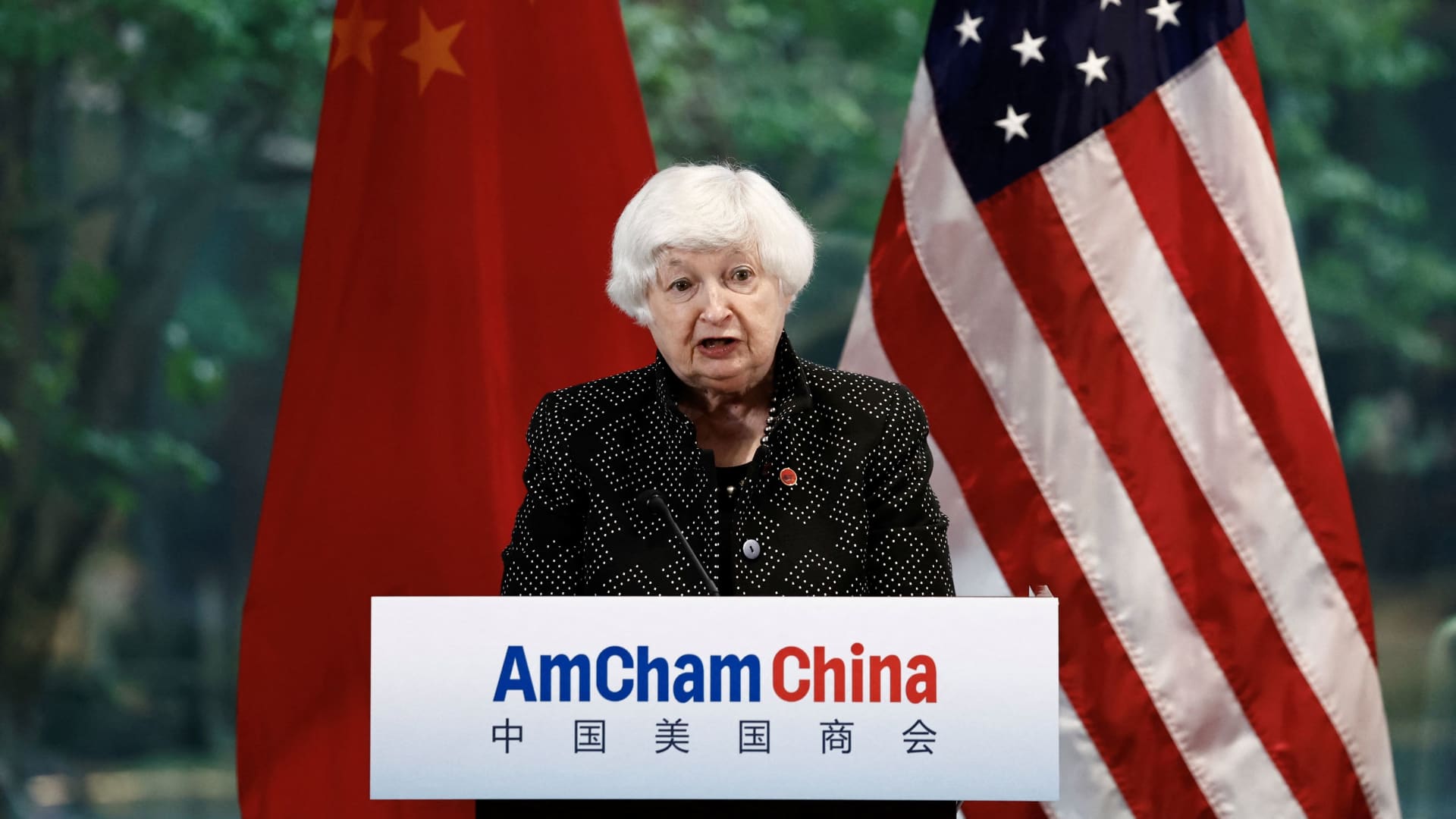U.S. Treasury Secretary Janet Yellen arrives at Guangzhou Baiyun International Airport, in Guangzhou, Guangdong province, China April 4, 2024.
Tingshu Wang | Reuters
BEIJING — U.S. Treasury Secretary Janet Yellen kicked off her first full day of official meetings in China with discussion about overcapacity concerns and encouragement to pursue market-oriented reforms.
Yellen arrived in the southern Chinese city of Guangzhou late on Thursday and is set to travel to Beijing on Saturday, where she will stay until Tuesday. It is her second trip to China as Treasury secretary.
It “remains crucial” to “closely communicate on issues of concern such as overcapacity and national security-related economic actions. It is what the world and our citizens expect of us,” Yellen said in prepared remarks for her meeting with Vice Premier He Lifeng on Friday. He is also director of the office of the Central Commission for Financial and Economic Affairs.
“A healthy economic relationship must provide a level playing field for firms and workers in both countries,” she said, adding the two countries need to collaborate on climate change and debt distress in emerging markets.
U.S. Treasury Secretary Janet Yellen shakes hands with China’s Vice Premier He Lifeng before their meeting at the Guangdong Zhudao Guest House, in Guangzhou, Guangdong province, China, April 5, 2024.
Tingshu Wang | Reuters
Yellen and He Lifeng are expected to have several discussions through Saturday morning. When she travels to Beijing, Yellen is scheduled to meet with Premier Li Qiang, Finance Minister Lan Fo’an, and Beijing mayor Yin Yong.
Ahead of the meeting with He, Yellen met with Wang Weizhong, governor of Guangdong province, of which Guangzhou is the capital.
“Throughout my engagements with my counterparts, I will stress that a healthy economic relationship can bring significant benefits for both our economies,” Yellen said in prepared remarks for her meeting with Wang.
Chinese Vice Finance Minister Liao Min (2nd R) and U.S. Ambassador to China Nicholas Burns (R) receive U.S. Treasury Secretary Janet Yellen (R) upon her arrival in Guangzhou on April 4, 2024.
Pedro Pardo | Afp | Getty Images
“I’ve also emphasized that building a healthy economic relationship requires a level playing field for American workers and firms, as well as open and direct communication on areas where we disagree,” Yellen said. “This includes the issue of China’s industrial overcapacity, which the United States and other countries are concerned can cause global spillovers.”
Meeting with U.S. businesses
Yellen on Friday also met with representatives from American, European and Japanese businesses.
“Overcapacity isn’t a new problem, but it has intensified, and we’re seeing emerging risks in new sectors,” Yellen said in prepared remarks at an American Chamber of Commerce in China event in Guangzhou.
“Overcapacity also poses challenges for Chinese firms and industries and can impact China’s productivity and growth,” she said. “I believe addressing overcapacity — and more generally considering market-based reforms — is in China’s interest.”
Analysts at U.S.-based consulting firm Rhodium Group said in a report in late March that Chinese government support for manufacturing in recent years has resulted in a build-up of production capacity that exceeds domestic demand.
“Many Chinese firms are still using overseas markets to make up for lower prices, margins, or even losses on the China market,” the report said.
Rhodium Group noted that Beijing has expressed its awareness and called for more guidance in investment to prevent overcapacity. “However, the solutions adopted will likely center on retiring obsolete capacity and letting the most uncompetitive companies shut down while continuing to support capacity expansion, innovation, and exports in others,” the report said.
China’s growth potential
Guangdong is one of the largest contributors to China’s economic growth and home to the city of Shenzhen, a major hub for tech companies and startups. Guangdong is by far the top province in China by value of exports, according to Wind Information.
“In recent decades, [Guangzhou] was at the forefront of market-oriented reforms that advanced China’s economic development and openness,” Yellen said in prepared remarks for her meeting with Wang.
“And I know this city retains tremendous importance today, including as a key hub for technology and manufacturing,” she said.
China is the world’s second-largest economy behind the U.S. Growth in the Asian country has slowed in the wake of a crackdown on property developers’ high reliance on debt for growth and alleged monopolistic practices by internet platform companies. Uncertainty about Beijing’s policies for bolstering consumption and growth overall have weighed on business and investor sentiment.
“China will likely continue to contribute about a third of the world’s economic growth while increasing its economic footprint, particularly in Asia,” Nicholas R. Lardy, senior fellow at the Peterson Institute for International Economics, wrote in Foreign Affairs on Tuesday.
“If U.S. policymakers underappreciate this, they are likely to overestimate their own ability to sustain the deepening of economic and security ties with Asian partners,” he wrote.
U.S.-China tensions
Yellen’s trip to China comes as both governments have tried to increase communication in what’s become an increasingly tense relationship.
U.S. Treasury Secretary Janet Yellen speaks during an event by the American Chamber of Commerce in China (AmCham China) in Guangzhou, Guangdong province, China April 5, 2024.
Tingshu Wang | Reuters
U.S. President Joe Biden and Chinese President Xi Jinping spoke by phone this week for the first time since their in-person meeting in California in November.
Wang Shouwen, a vice commerce minister and head of international trade negotiations, visited the U.S. from Tuesday to Friday for the first vice-ministerial meeting of a bilateral commerce and trade working group, according to a ministry readout.
Plans for regular meetings of such working groups were announced after Yellen and U.S. Commerce Secretary Gina Raimondo visited China last year.
U.S. Secretary of State Antony Blinken is expected to make another trip this year, after making a long-delayed visit to China in June 2023.
